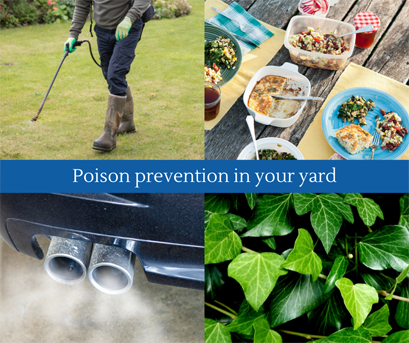National Poison Prevention Week
March 20, 2022
Ninety percent of poisonings occur at home. Oftentimes, items such as: cleaning products, medications, or carbon monoxide, are thought of when considering the dangers at home, but there are many poisons outside the home, and in your yard to be aware of as well.
Starting with the garage, chemicals should be kept in a locked cabinet and out of reach of children. Carbon monoxide poisoning can easily occur inside a garage if the car is idling. Opening the garage door helps, but the best practice is to back the vehicle outside the garage when it is running.
In the yard, pesticides or weed killers can be dangerous if ingested, inhaled or when making contact with the skin. When using such chemicals it’s best to wear gloves, long sleeves, and pants to protect the skin. Avoid recently sprayed areas for at least one hour until the spray has dried. It’s recommended that children and pets avoid recently sprayed areas for at least 24 hours.
Other concerns in the yard are the things that grow wild. As the names explain, poison ivy, poison sumac, or poison oak are just some of the plants to avoid. Some wild berries can be a concern, and eating even a few bites of certain mushrooms can cause severe liver damage or death.
There are certain chemicals we apply to our skin regularly such as sunscreen and bug spray that are helpful when used as recommended, but can be dangerous, especially in the hands of children. Spray applications are of most concern. Always avoid eyes, and do not allow children to apply it to themselves. It is recommended to wash the skin with soap and water after returning indoors.
Lastly, as temperatures rise, so does the danger of keeping food out, and food poisoning. Popular foods that can spoil quickly when not kept cold include: party platters, meat, seafood, dairy products, eggs, mayonnaise, and cooked vegetables. Even inside at room temperature, foods should not be left out for more than two hours.
With the wide variety of types of poisonings out there the symptoms can vary significantly. Here are some of the basic symptoms to watch for in poisoning: burns or redness, breath smells like chemicals, vomiting, difficulty breathing, drowsiness, confusion, or altered mental state.
When in doubt, call your local poison control line, or contact Mille Lacs Health System at 320-532-3154. Urgent Care is available seven days a week, 8:00 a.m. – 8:00 p.m., and the Emergency Department is open 24 hours a day, seven days a week.
